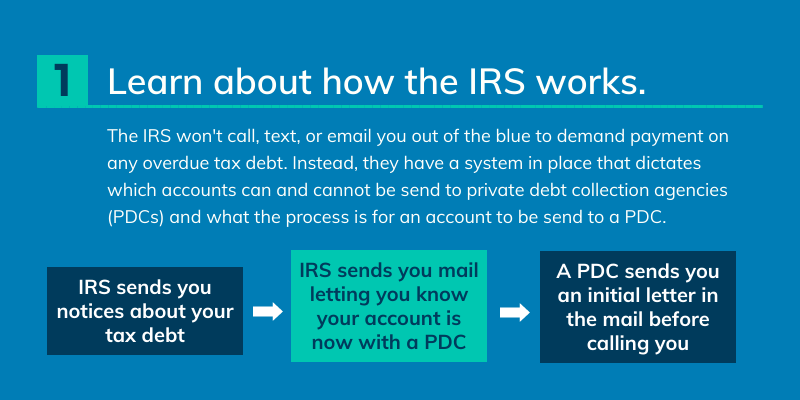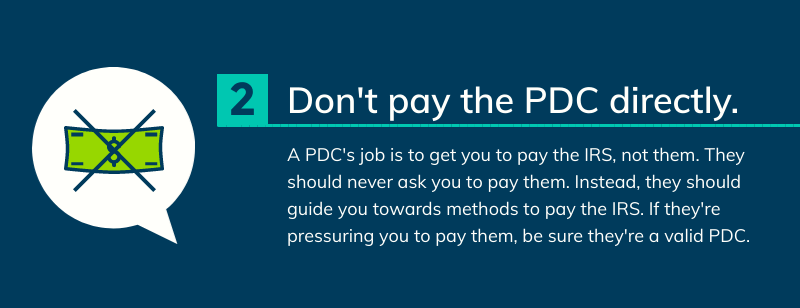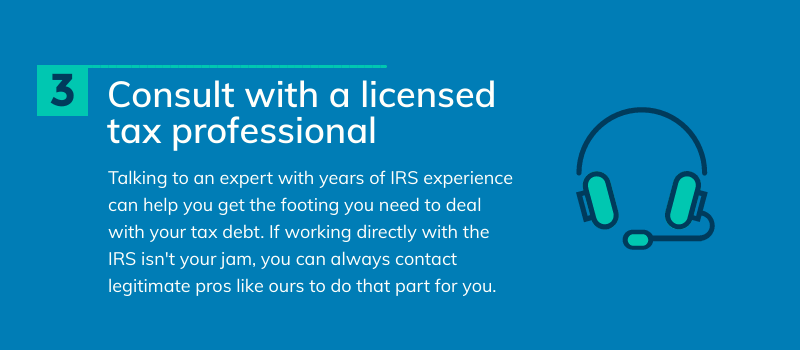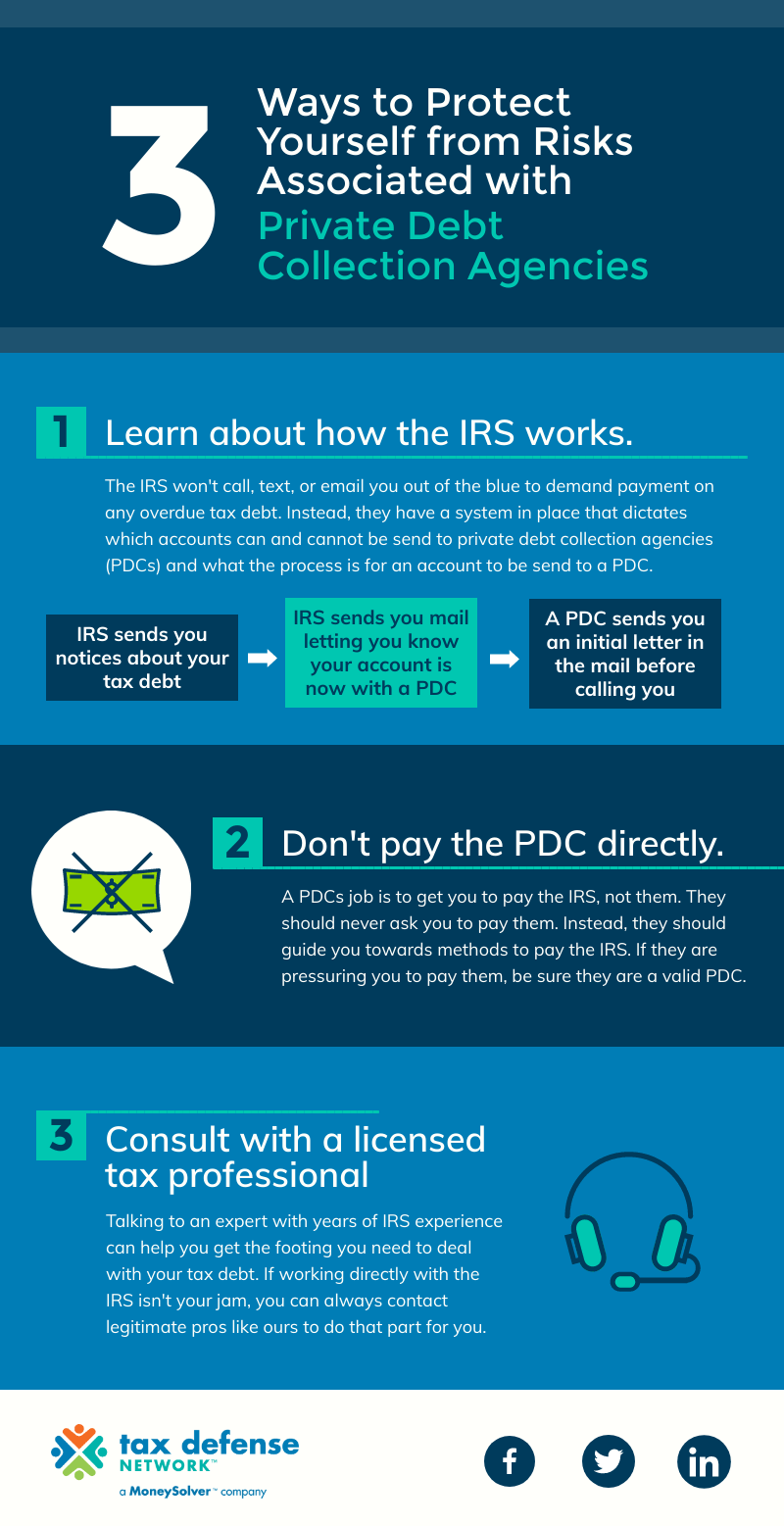The Truth About the IRS’s Private Debt Collection Agencies
Five years ago, the IRS called for backup from the private sector. What does this backup look like? Four private companies that can come after your tax debt in lieu of the IRS. Here’s what you need to know about private debt collection agencies (PDCs) to stay informed, lawful, and safe.
What’s the deal with private debt collection agencies (PDCs)?
PDCs aren’t rookies to the federal-tax-debt-collection game – they assisted the IRS in both 1996-1997 and 2006-2009. Despite warnings from the IRS and National Tax Advocate on the unsuccessfulness of these previous IRS private debt collection program efforts – wasting money, yielding fewer collections than expected, and contributing to inequities in the U.S. tax collection system – history repeated itself in 2015.
Congress passed Fixing America’s Surface Transportation Act (FAST Act) in December 2015. While it’s technically a highway bill, the FAST Act included a debt-collection section requiring the IRS to use PDCs for outstanding tax debt that the IRS is no longer pursuing. The IRS has since hired four PDCs: ConServe, Performant Recovery, CBE Group, and Pioneer (which is actually a subsidiary of student loan servicer, Navient)
Not all tax debt cases are eligible for PDCs to handle. The IRS won’t hand the following accounts over to PDCs:
- Accounts with an Offer in Compromise agreement or an installment agreement
- Innocent Spouse cases
- Accounts for minors or the deceased
- People in designated combat zones
- Taxpayers in federally declared disaster zones who have requested relief from debt collection
- Victims of tax-related identity theft
The Taxpayer First Act, a recent bipartisan law passed by Congress in 2019, also states that the IRS cannot use PDCs for taxpayers with an adjusted gross income of less than 200 percent of the federal poverty level.
While past programs using of third party debt collectors were stopped because they lost money, this doesn’t appear to be the case currently. The results from 2019 show that the IRS was able to collect nearly $213 million in debt using PDCs, which was the largest amount of money recovered since the program was started in 2015.
What are the risks associated with PDCs?
PDCs themselves aren’t necessarily risky or problematic. However, the loopholes of the PDC program has many problems. Here are some of the dangers associated with private debt collection:
Scam magnets
More scam artists can pretend to be PDCs, especially because PDCs aren’t required to identify themselves as IRS contractors. The Treasury Inspector General for Tax Administration (TIGTA) reported that 15,780 people have fallen victim to tax scams and have lost upwards of $79.7 million collectively as of September 2019.
Here’s a smart rule of thumb: Do not disclose any personal information to someone randomly demanding payment over the phone or internet. In fact, don’t engage with any callers claiming to be IRS employees. If you think you might owe taxes, hang up and call the IRS directly at 800-829-1040 instead.
Elevated risk for low-income taxpayers
Private collectors have an agenda to push people to make tax payments, even if the taxpayers can’t afford it. This can create economic hardship for people who would otherwise qualify for alternative payment plans by the IRS.
In 2017, National Taxpayer Advocate found that 19 percent of taxpayers outsourced had incomes below the federal poverty line. And 28 percent of people assigned to PDCs earned less than $20,000. This leaves low-income, elderly, and income-restricted individuals buried deeper and deeper in economic woes and unpayable debt.
A lack of consumer awareness
The IRS wants consumers to know what’s up, but public awareness campaigns are minimal at best due to drastic IRS funding cuts. As a result, consumers are left in the dark and even more vulnerable to scams.
Ignorance is not bliss when it comes to your back tax situation. Having as much knowledge as possible about your account (and whether it’s in the hands of a third party or the IRS) is vital.
What do you need to know to protect yourself?
Learn about how the IRS works
The IRS isn’t like your crazy ex. The agency will never call, text, or email you out of the blue to demand payment. And they definitely won’t demand that you give them your credit card number on a phone call or threaten to bring in law-enforcement agencies to have you arrested for not paying. Instead, they prefer contacting taxpayers via notices in the mail (like a Notice CP14) that progressively increase in urgency to act.
If they have assigned your case to a PDC, the IRS will then send you Notice CP40 and Publication 4518, which will let you know that they’ve assigned your account to a PDC. They won’t surprise you by handing you off to a third party without giving you a heads up. And once the private debt collector has your account, they’ll send you an initial letter in the mail too before contacting you via phone.
However, the IRS can only contact you with the information they have on file. So, if the address you’ve given them in the past is not where you currently reside, you’ll need to update them on your current address to receive these helpful notices.

Don’t pay the private debt collector directly
Though the IRS hired the PDC to collect your debt, you’re not actually writing out your check to the PDC. All your repaid debt will go straight to the IRS as usual.
A private collection agency should never ask you to pay them directly. Their job is to work with you to resolve your tax debt. They should provide you with information about IRS payment options, whether that’s electronically online or via check payment made payable to the U.S. Treasury sent in the mail directly to the IRS.

Consult with a licensed tax professional
Turning to a licensed tax professional – which may include CPAs, enrolled agents, or tax attorneys – can give you the support and direction you need regarding your tax debt. These experts can negotiate with the IRS on your behalf to relieve tax debt or tie-ups like liens, levies, and wage garnishments.

While the lawfulness of PDC use is under scrutiny, it is today’s reality. The key to avoiding trouble is being smart about tackling your tax debt and not going at it alone.
Remember: It’s crucial that you never disclose information to someone calling or messaging to collect immediate payment. Instead, call the IRS directly to see if you owe taxes.

*Read the original post on our Tax Defense Network blog
